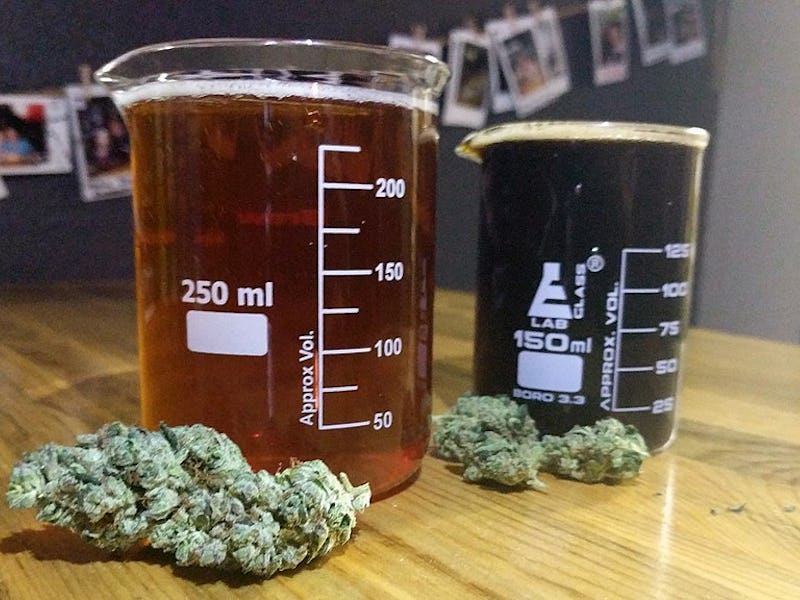New Marijuana Beer Contains a "Decelerant" That Scientists Can't Figure Out
"I can't think of a way this would at all be possible."

Earlier this year, Canadian “cannabis brewery startup” Province Brands announced it was on their way to creating a bonafide weed beer. The startup isn’t the first to embark on the road to THC-laced drinks, but their barley-based and cannabis oil-laced concoction boasts some strange “proprietary” additives. Most interesting is a “decelerant” that the company says will provide a quick and easy comedown from the high, leaving you sober and ready to go about your business.
To make their product, Province Brands teamed up with another Canada-based cannabis oil company, Element GP, to help moderate the effects of this experimental weed beer. In June, The Toronto Star reported that “The beverage will contain an accelerant to make intoxicating effects hit faster like alcohol, and a decelerant to bring the effect down sooner than, say, smoking a joint.” It’s not a bad idea, considering that nobody has completely figured out how to regulate the combined effects of THC and alcohol just yet.
The problem is, the existence of such a fast-acting “decelerant” is at this point unknown in the field of pharmacokinetics, in which scientists study how drugs interact and get absorbed by your body.
“I can’t think of a way this would at all be possible,” Gail Anderson, Ph.D., a professor in the University of Washington’s Department of Pharmacy, tells Inverse. “The way this works is to increase the production of enzymes, and it takes days to do that.”
Province Brands is very excited by their foray into marijuana-brewed beer
To understand why this ‘decelerant’ is so inconceivable to experts, you have to understand how your body processes the things you put into it, particularly if that thing is a psychoactive like THC. Once THC enters the bloodstream, Anderson explains, it is nearly completely converted into an “active” metabolite. This means that, even as it’s broken down into a different chemical form, it still has some effect on your body. THC is first metabolized into a psychoactive form called 11-hydroxy-THC and then, later, into the non-psychoactive 11-nor-9-carboxy-THC.
Your body manipulates THC into these forms using a battery of enzymes in a process called “clearance.” To quickly come down from a high, you’d need to find a way to speed up the work of the enzymes involved in clearance. This is a tall order for Province Brands’ supposed “decelerant.”
“In the case of cannabis oil, metabolic clearance by the liver is what they’re talking about when it comes to being eliminated quicker,” Anderson adds. “They’re suggesting that they added something to increase metabolism. There’s nothing that just does that with an acute product.”
St. John's Wort is a potential enzyme inducer, but it doesn't work very quickly
That said, there are enzyme-inducing substances that could be potential candidates for the mystery “decelerant.” St. John’s Wort, for example, is a known inducer of cytochrome p450 — an enzyme known to help metabolize drugs — as are certain prescription drugs like omenprazole (used to treat ulcers) or phenobarbitol (used to treat epilepsy). But none of these work acutely, so you’d have to take them consistently to see an enzyme-inducing effect.
“I have no idea how they think to be able to speed up the reverse process,” Daniel Piomelli, Ph.D., a pharmacokineticist at the University of California Irvine, tells Inverse. “They may have patented or not, so the information may be completely inaccessible.”
So with these potential candidates in mind, Province Brand’s “decelerant” still remains a mystery. They’ve yet to respond to request for comment on this issue, and for now, the pharmacological jury is definitely still out.